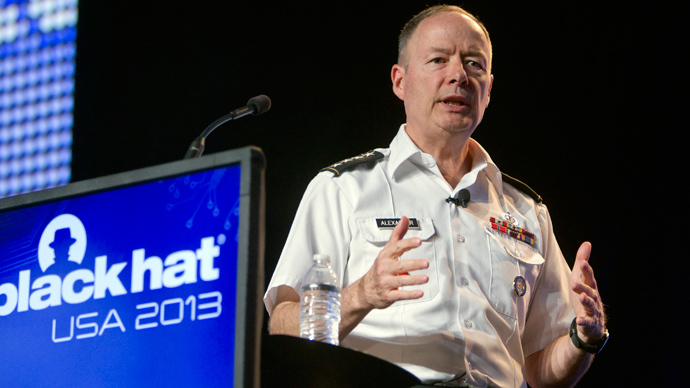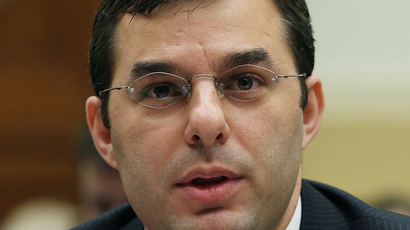NSA director booed during ‘unconvincing’ hacker conference speech

National Security Agency Director Keith Alexander was jeered as he pleaded with professional hackers and cyber-security experts to reconsider the indiscriminate NSA surveillance during a speech at the annual Black Hat conference in Las Vegas, Nevada.
Alexander claimed that the surveillance methods, disclosed by former NSA contractor Edward Snowden, have been mischaracterized by the media and are subject to rigorous government oversight. He was approximately 30 minutes into his speech when an audience member, later revealed to be 30-year-old security consultant Jon McCoy, shouted “Freedom!”
“Exactly,” Alexander replied from the stage. “We stand for freedom.”
“Bullshit!” McCoy said.
“Not bad,” the NSA director retorted. “But I think what you’re saying is that in these cases, what’s the distinction, where’s the discussion and what tools do we have to stop this.”
“No, I’m saying I don’t trust you,” McCoy said over applause.
“You lied to Congress,” another voice jumped in. “Why would people believe you’re not lying to us right now?”
“I haven’t lied to Congress,” said Alexander, who is notoriously press averse. “I do think it’s important for us to have this discussion. Because in my opinion, what you believe is what’s written in the press without looking at the facts. This is the greatest technical center of gravity in the world. I ask that you all look at those facts.”
Hacker Karsten Nohl, who attended the conference, told RT that Alexander’s speech, while applauded by supporters, offered little new information in his defense of the program.
“I think General Alexander’s aim was to reach out to the community and start a dialog with security experts, or at the very least make it look as if he did,” he said. “He came out saying that he wanted to share new information but really all that he did was to confirm what everybody had already known.”
“He emphasized over and over again that they are just collecting it but not actually looking at it except for in very few cases and the few he mentioned were terrorism cases,” Nohl continued. “Of course that now leads to all kinds of criticisms in terms of trust the NSA to have this data and not using it. To me, at least, that was not very convincing.”
The general was asked to give the keynote address before Snowden revealed the existence of the PRISM and Tempora electronic programs as well as orders directing Verizon Communications to turn over the phone records for millions of Americans. Black Hat organizers told CBS Alexander could have opted out of the conference but chose not to.
He admitted the NSA’s public image has been damaged, but claimed only 35 employees are authorized to review phone surveillance queries, and only 22 who can actually approve the monitoring of specific phone numbers.
“Their reputation has been tarnished,” he said. “But you can help us articulate the facts properly. I will answer every question to the fullest extent possible, and I promise you the truth: What I know, what we’re doing, and what I cannot tell you because we don’t want to jeopardize the future of our defense.”
US Congressmen admitted frustration with Alexander earlier this year when the NSA chief offered the vague assertion that the data collection has “helped thwart dozens of terrorist events.”
Alexander maintained the surveillance is legal because it was approved by the secret Foreign Intelligence Surveillance Court, which approved 1,748 surveillance applications of the 1,789 it received.
“I’ve heard the court is a rubber stamp,” he said. “I’m on the other end of that table, against the table of judges that don’t take any – I’m trying to think of a word here – from even a four-star general. They want to make sure that what we’re doing comports with the constitution and the law. I can tell you from the wire brushing I’ve received, they are not a rubber stamp.”
Alexander claimed the agency has the capability to monitor its own employees, a somewhat odd revelation in light of a recent claim from an NSA staffer who denied they could search staff emails. Pro Public filed and Freedom of Information Act request seeking emails between employees and the National Geographic channel, which reporters suspect of airing sympathetic documentaries on the NSA.
“There’s no central method to search an email at this time with the way our records are set up, unfortunately,” an NSA spokesperson said last week, a claim seemingly at odds with Alexander’s speech.
“The assumption is our people are just out there wheeling and dealing,” he said Wednesday. “Nothing could be further from the truth. We have tremendous oversight over these programs. We audit the actions of our people 100 per cent.”














